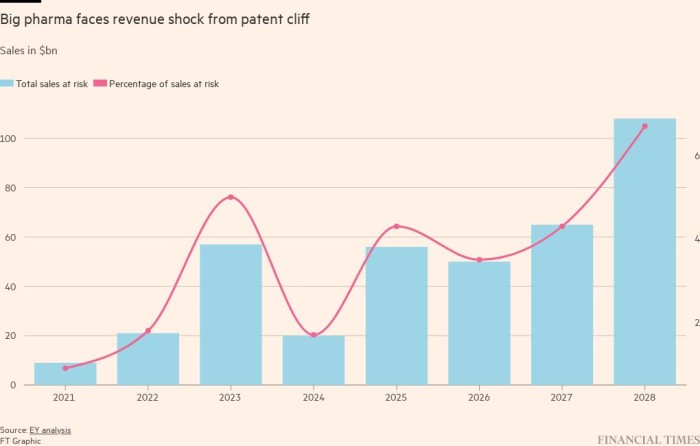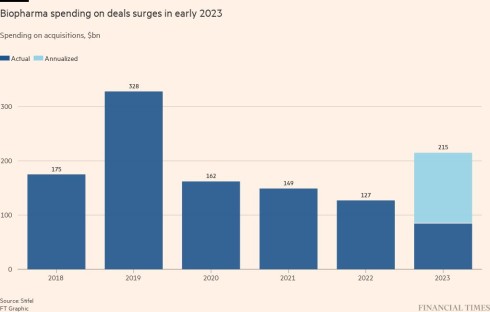Big Pharma dealmaking recovers with $85bn M&A splurge
Pharmaceutical and biotech companies spent $85bn on acquisitions in the first five months of the year, marking a dramatic recovery in dealmaking as they seek to replenish their drug pipelines.
The surge in M&A, compared to just $35.6bn in deals in the same period of 2022 and $49.1bn the year before, according to Stifel, an investment bank, is being fuelled by large cash reserves amassed by Big Pharma during the coronavirus pandemic and investor concerns about future growth prospects.

Pfizer, Merck and Sanofi have led the M&A revival this year by announcing multibillion-dollar acquisitions, even as dealmaking across other market sectors has fallen sharply due to rising interest rates and tighter bank lending.
“It’s a big turnround and completely bucking the overall trend in the M&A market,” said Tim Opler, managing director at Stifel’s global healthcare group. “If we maintain the pace of the first five months and a week we would be on track to have a $215bn year.” In 2022 the total value of biopharma deals was $127bn while in 2021 it was $149bn.

But at Bio International Convention, one of North America’s largest biotech conferences, last week in Boston, company executives, bankers and sector analysts were not celebrating the return of dealmaking. Rather, they were fretting about the rising threat that US antitrust regulators have begun a crackdown on consolidation in the sector.

The next test for antitrust authorities involves Pfizer’s takeover of oncology-focused Seagen. The FTC must decide within days whether to extend the initial 30-day time period for a review of the deal, which is central to Pfizer’s efforts to return to growth after a sharp fall in Covid revenues this year.
“We could see a potential challenge to Pfizer/Seagen as this would represent an even larger transaction,” said Evan Seigerman, analyst at BMO Capital Markets, in a note published after the FTC sued Amgen.
But for the moment Pfizer and Seagen are confident their deal will not draw fire from the FTC, arguing there is no product overlap and that it would benefit competition and innovation.
“It's not even unlikely, its like zero [chance]. It is not going to happen,” said Epstein, noting that the break-up fee Pfizer would pay Seagen in that event is almost $2.3bn.
This story originally appeared on: Financial Times - Author:Jamie Smyth




























